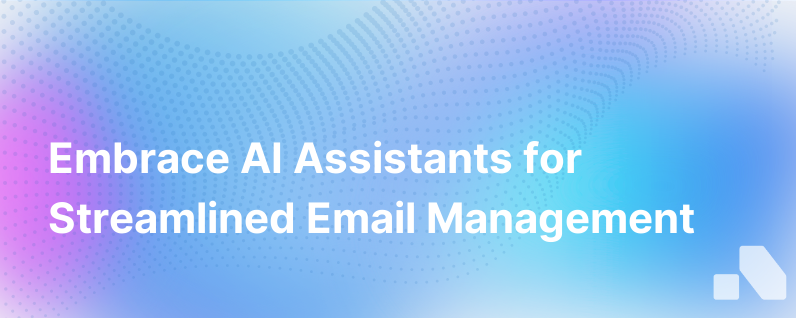
In the business landscape, time is the ultimate currency. You need to do more, reach further, react faster – and you need to do it all now. For many professionals, the bottleneck to productivity can often be traced back to one ubiquitous task that consumes the bulk of their workday: email management.
Executives often find themselves buried under an avalanche of emails. According to a report from the McKinsey Global Institute, the average knowledge worker spends 28% of their workweek managing email. That’s over 11 hours per week on an activity that, frankly, is highly receptive to delegation.
Enter AI email assistants. Imagine slicing that time in half or more, all while improving your response quality and keeping your personal touch. That's what AI-powered email management tools promise – and they are reshaping the future of workplace communication. As technology advances, it's time to consider handing over the reigns of your inbox to an AI assistant.
The Rise of AI in Email Management
Artificial intelligence excels at automating repetitive tasks and recognizing patterns – two key aspects of email management. Here’s what AI is doing for emails right now:
- Sorting and Prioritizing Inbound Mail: An AI assistant can learn your preferences and sort emails by importance or required action, allowing you to focus on the emails that really matter.
- Spam and Clutter Reduction: AI can filter out irrelevant messages before you ever see them, keeping your inbox focused on legitimate communication.
- Smart Replies and Drafts: Using natural language processing, an AI can suggest or compose professional responses to common queries.
- Email Insights and Analytics: AI tools can analyze your email patterns and provide insights to help optimize how you spend your time communicating.
- Scheduling: AI can coordinate with recipients to find the best times for meetings, keeping an eye on your calendar to avoid conflicts.
- Follow-up Reminders: Never drop the ball on an email chain again. AI can remind you to follow up on important threads that haven't had a response.
The Benefits of Delegating Email Tasks to AI
Handing over tasks to AI isn’t just about saving time – it's about reshaping workflows to optimize efficiency and effectiveness. Let's explore the benefits.
Increased Productivity
By automating lower-level email tasks, you free up mental space and time for strategic thinking and more complex work. You can focus on creativity and idea generation rather than logistics and coordination.
Improved Response Times
With AI handling initial responses or sorting emails by urgency, you can get back to clients and colleagues faster. This can enhance your reputation for reliability and responsiveness, which is invaluable in today's fast-paced business environment.
Enhanced Work-Life Balance
By streamlining email management, you can reduce overtime and the need for checking your email outside of business hours. This means more time for personal pursuits and a healthier work-life balance.
Reduced Human Error
An AI doesn’t forget or overlook details. It can consistently perform tasks to the same standard without any variance, reducing the risks of human error – an essential aspect when it comes to managing important business communications.
Scalability
AI learns and adapts over time. The more you use it, the more efficient it becomes, enabling your email management system to scale with your organization’s growth without the need for additional human resource investment.
Implementing AI Email Assistants
The transition to AI email management doesn’t have to be abrupt. Here are some steps you can follow to integrate AI seamlessly:
-
Identify Repetitive Email Tasks: Look for patterns in your current email activity. Which tasks are predictable or repetitive enough for automation?
-
Choose the Right AI Tools: Select an AI email assistant that integrates well with your current email platform and meets your identified needs.
-
Start with Low-risk Tasks: Begin by delegating low-risk tasks such as sorting or auto-replying to emails. This is a good testing ground and provides valuable training data for the AI.
-
Review Regularly: At first, closely monitor the AI’s performance, to ensure it’s working appropriately and to refine its actions based on your preferences.
-
Gradually Increase Responsibility: As your confidence in the AI grows, you can incrementally entrust it with more complex tasks.
Looking to the Future
An AI assistant doesn’t just help with your current workflow – it positions you to navigate an increasingly digital future. As remote work becomes more widespread and workflows become ever more digital, AI will become an essential tool in maintaining productivity and competitive edge.
Conclusion
In a world where 'busy' is the norm, and 'overwhelmed' is on the horizon, AI email assistants are not just a convenience – they are fast becoming a necessity. As the capabilities of AI continue to evolve, the question shifts from 'Why should I use an AI assistant for email?' to 'Can I afford not to?'
At Aomni, we understand the shifting dynamics of the work environment and the critical role technologies like AI play in maintaining a competitive advantage. As we write new chapters of business efficiency, it's time we all consider partnering with an assistant that doesn’t tire, doesn’t procrastinate, and doesn't overlook – the AI email assistant.